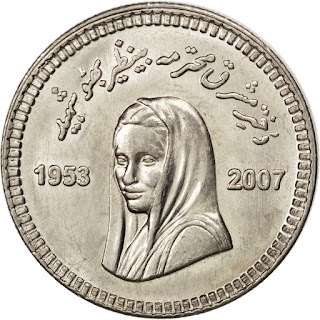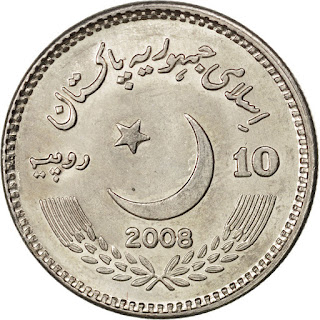Pakistan Coins 10 Rupees 2008 Benazir Bhutto
Commemorative issue: 1st Death Anniversary of Benazir Bhutto - Daughter of the East, The Martyr.
Obverse: Star and crescent (Symbol of Islam and Pakistan), wheat wreath below.
Lettering: 10 2008.
Reverse: Benazir Bhutto, Urdu script legend above.
Lettering: 1953 2007.
Edge: Reeded.
Composition: Copper-Nickel.
Weight: 8.25 g.
Diameter: 27.5 mm.
Thickness: 2.12 mm.
Benazir Bhutto
Benazir Bhutto (June 21, 1953 – 27 December 2007) was the 11th Prime Minister of Pakistan, serving two non-consecutive terms in 1988–1990 and then 1993–96. A scion of the politically powerful Bhutto family, she was the eldest daughter of Zulfikar Ali Bhutto, a former prime minister himself who founded the centre-left Pakistan Peoples Party (PPP).
In 1982, three years after her father's execution, 29-year-old Benazir Bhutto became the chairperson of the PPP — a political party, making her the first woman in Pakistan to head a major political party. In 1988, she became the first woman to be elected as the head of an Islamic state's government; she also remains Pakistan's only female prime minister. Noted for her charismatic authority and political astuteness, Bhutto drove initiatives for Pakistan's economy and national security, and she implemented capitalist policies for industrial development and growth. In addition, her political philosophy and economic policies emphasised deregulation (particularly of the financial sector), flexible labour markets, the denationalisation of state-owned corporations, and the withdrawal of subsidies to others. Bhutto's popularity waned amid recession, corruption, and high unemployment which later led to the dismissal of her government by conservative President Ghulam Ishaq Khan.
In 1993, Bhutto was elected for a second term after the 1993 parliamentary elections. She survived an attempted coup d'état in 1995, and her hard line against the trade unions and tough rhetorical opposition to her domestic political rivals and to neighbouring India earned her the nickname "Iron Lady"; she was also respectfully referred to as "BB". In 1996, charges of corruption levelled against her led to the final dismissal of her government by President Farooq Leghari. Bhutto conceded her defeat in the 1997 Parliamentary elections and went into exile in Dubai in 1999. Nine years later, in 2007, she returned to Pakistan, having reached an understanding with President Pervez Musharraf, who granted her amnesty and withdrew all corruption charges against her. Bhutto was assassinated in a bombing on 27 December 2007, after leaving PPP's last rally in Rawalpindi, two weeks before the scheduled 2008 general election in which she was the leading candidate. Her party subsequently won the elections on a wave of sympathy generated by her assassination.

